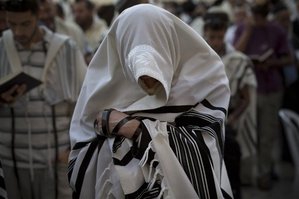Tuesday 23 December 2014 - 00:13
Story Code : 5820
On eve of Jewish new year, Israelis dread possible Iran strike and worry about ties with US
JERUSALEM � Israelis ushered in the Jewish New Year on Sunday with a sense of uncertainty, fearful that war with Iran could break out this year.
The two-day Rosh Hashana holiday, which was beginning at sundown, commemorates the creation of the world � which this year reached the age of 5773, according to the Jewish calendar. In synagogues, special prayers are recited and a ram�s horn is blown, and at festive family meals, apple slices are eaten in honey to signify a sweet new year. The holiday also begins a 10-day period of introspection culminating with Yom Kippur, or the Day of Atonement.
Police spokesman Micky Rosenfeld said several thousand police officers were on patrol in Jerusalem, a standard deployment to secure public areas during the holiday. But paramilitary border police and undercover units were also deployed in case of additional demonstrations by Muslims in the city against an incendiary film portraying the Prophet Muhammad. Small protests took place in Jerusalem last week, though nothing close to the intensity of larger demonstrations in Libya, Yemen and Egypt.
In a break from years past, Israel did not seal off the West Bank or restrict entry of Palestinians into Israel for this year�s holiday. In recent months, Israel has relaxed restrictions on West Bank Palestinians, issuing them more Israeli work permits and allowing tens of thousands to visit Israel during the Muslim holy month of Ramadan and the subsequent Eid al-Fitr holiday.
Public transportation and stores shut down for the festival and the country came to a standstill as Israelis sat down with family and loved ones for the traditional holiday dinner Sunday night.
Edna Cohen, 64, from Petah Tikvah said that media reports of possible hostilities with Iran are making her feel uneasy. �There is a lot of talk in the papers and on the radio about this and I get worried,� she said.
Earlier in the day, Israelis packed grocery aisles and stocked their carts with last-minute essentials for the holiday.
At a kiosk in Jerusalem, Arielle Goetschel, 23, who immigrated from France two weeks ago, said she was stressed, joking that she couldn�t find the vegetables she needed � but mainly because of the threat of a war with Iran.
�We�re really worried,� Goetschel said, standing next to her husband. But, she added: �We want to be with the rest of the Jews. We feel more secure here.�
The possibility that Israel may strike Iran�s nuclear program to prevent it from developing the capability to make weapons-grade material has dominated headlines in the Jewish state for the past year. Israeli rhetoric has reached a fever pitch in recent weeks, with leaders claiming that Iran is getting perilously close to developing a nuclear bomb.
Israel considers a nuclear-armed Iran to be a mortal threat. It cites Iranian threats to destroy Israel, Iran�s development of missiles capable of striking it, and Iranian support for Arab militant groups on Israel�s northern and southern borders. Iran says its nuclear program is for peaceful purposes only.
The Iran Project is not responsible for the content of quoted articles.
# Tags











